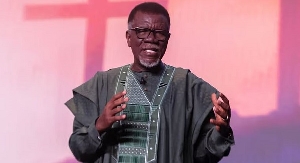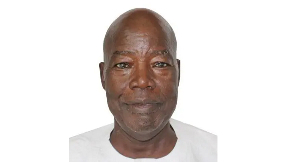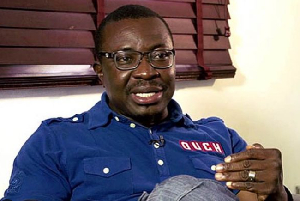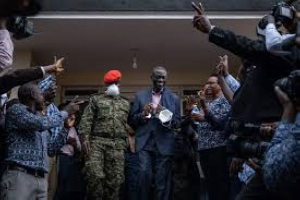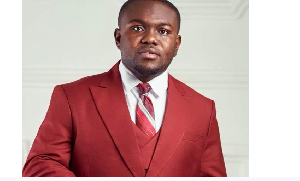When Dr. Paa Kwesi Nduom speaks of it being ?time to remove the politics of bitterness and anger in the country since 1992,? it is not clear whether the former New Patriotic Party (NPP) cabinet member understands precisely what he is talking about.
First of all, it amounts to the very height of contradiction and downright hypocrisy for the presidential candidate of a party that has given more grief and distress to Ghanaians than any other to be grandstanding about the need for the prompt removal of acrimony from the Fourth-Republican Ghanaian political landscape.
In sum, if Paa Kwesi Nduom were that serious about his pontifical proclamations, the Komenda, Edina, Eguafo, Abirem (KEEA) Member of Parliament would not have cynically opted for leadership at the head of the rump-Convention People?d Party (CPP); for the history of the CPP is indisputably one of a brazen one-party dictatorship. And for those potential Ghanaian voters who were either not born or are too young to remember, it was the Nkrumah-led CPP whose untold socioeconomic, political and cultural atrocities visited on Ghanaians, during the country?s First Republic, made the unsavory culture of military coups-d??t an appealing feature of postcolonial Ghanaian politics.
Perhaps all potential voters ought to avail themselves of the history of the first two decades of ?sovereign? Ghanaian politics before deciding to cast their ballots for any of the political parties competing in Election 2008. Indeed, while he is a little older than this writer, it is very doubtful whether the presidential candidate of the rump-CPP knows any more about the nefarious activities of the Nkrumah government ? both at home and abroad ? beyond chanting such blasphemous and cynical slogans as ?Nkrumah Never Dies,? ?Work and Happiness? and ?Forward Ever, Backward Never.?
For, needless to say, Paa Kwesi was barely a teenager when the CPP was overthrown; and so at best, his closest association with the proto-CPP came through his brief membership in the neo-Nazi and pro-Hitler Young Pioneers? Movement (YPM).
And it is his latter experience that makes Dr. Nduom, an American-trained millionaire, an immitigably dangerous actor on the postcolonial Ghanaian political landscape. For while he most definitely may be a proverbial force to reckon with in his line of professional training ? business management and administration ? as a politician, Paa Kwesi Nduom knows very little about the deleterious and regressive ideology of the very party whose leadership mantle he recently assumed. This wretched state of affairs also largely accounts for the fact that the rump-CPP flagbearer keeps issuing statements that are invariably in diametric contradiction to the truth and the realities of postcolonial Ghanaian politics.
For instance, anybody who glibly claims that ?the politics of bitterness and anger? crept into the mainstream of Ghanaian politics only during the last decade-and-half, must be a belatedly naturalized Ghanaian, that is, one who recently arrived in the country; or at best, such claimant is likely not to be other than a raw, brash teenager. And if, indeed, such claimant happens to be a 45-year-plus-old Ghanaian adult, then the subject in question must unarguably be living in a fool?s paradise.
Indeed, by his legion misguided pronouncements, it appears that Paa Kwesi Nduom likely returned, from his remarkable pursuit of advanced studies in the United States, to Ghana in 1992 or thereabouts, which is all right. What is not all right is when the Johnny-Come-Lately also presumptuously attempts to postdate postcolonial Ghanaian history to 1992.
To be certain, the ?politics of bitterness and anger? was sown and brazenly nurtured by the Nkrumah-led Convention People?s Party. Thus, Paa Kwesi Nduom is either a charlatan or a demagogue by his very cynical attempt to both opportunistically abbreviate and revise postcolonial Ghanaian history.
What boggles this writer?s mind, and perhaps the minds of a legion other Ghanaians, is the heretical chutzpah mustered by the unforgivably cavalier likes of Dr. Nduom to resurrecting both the name and insignia of the most corrupt, repressive and divisive political party in modern Ghanaian history. Indeed, there was a time, not quite awhile ago, when it was an outright seditious offence for any Ghanaian political operative to attempt to revive the names of any of the old political parties. Such summary proscription was quite in order, because it was aimed at ridding Ghanaians of the very ?politics of bitterness and anger? which Paa Kwesi Nduom claims, rather quizzically, to be doing.
Needless to say, if, indeed, Paa Kwesi Nduom seriously believed that the rump-CPP were a force to reckon with, why did the KEEA MP eagerly and greedily opt to ?serve? under the Danquah-Busia-leaning New Patriotic Party for two consecutive terms? Where I come from in Ghana, we call unprincipled knaves with the political temperament of Dr. Nduom?s ?political prostitutes? and ?impudent opportunists.? And the fact that he both dresses like the infamous African Show Boy and sports an Nkrumaist haircut, ought to convince every well-meaning Ghanaian voter that Paa Kwesi Nduom is a recklessly regressive Ghanaian politician who is hell-bent on revisiting the regrettable Ghanaian past on his fellow countrymen and women.
It is also rather absurd for the rump-CPP presidential candidate to claim that: ?This is the time for the CPP, which has for more than 50 years, preached and practiced one nation, one people, and one destiny, to come and unite the country.?
Perhaps somebody with a more honest sense of Ghanaian history ought to inform Dr. Nduom that the CPP and its Machiavellian leader, the so-called Africa?s Man of Destiny, were the first to introduce political division into the country. For the CPP was founded on opportunistic political division. The CPP government was also the first to initiate and unconscionably execute deportation orders against Ghanaian-born citizens of immigrant parents. And to be certain, oftentimes most of these deportees, whose sole crime was their convicted refusal to blindly buy into the CPP?s Soviet-style communism, were either third- or even fourth-generation Ghanaian citizens; some also had ancestral roots going even deeper, in time, than those of Nkrumah himself!
In sum, rather than presume to pontificate on harmonious and exemplary democratic leadership, Paa Kwesi Nduom ought to be going about with his head on his chest and knees on the ground apologizing to all well-meaning and innocent Ghanaians for the untold atrocities visited on them, their relatives and friends by the abominable Convention People?s Party.
As for his vacuous and cheap talk about the rump-CPP?s intent on revisiting Nkrumah?s so-called Accelerated Development Plan for the North, some levelheaded Ghanaian needs to point out to the would-be Nkrumah avatar that by 1963, a full three years before his auspicious and globally celebrated overthrow, Nkrumah had, literally, run the hitherto robust Ghanaian economy aground. Indeed, reliable legend even has it that his shocking discovery of a bankrupt national treasury had prompted Gen. E. K. Kotoka to regret having ousted the CPP when the National Liberation Council (NLC) did. The immortalized Ghanaian hero would confide to Professor L. H. Ofosu-Appiah that it would have been far more expedient and glorious to have had the civilian Ghanaian populace itself chase Nkrumah and his odious and extortionate CPP out of the Flagstaff House and the Osu Castle.

Views expressed by the author(s) do not necessarily reflect those of GhanaHomePage.


